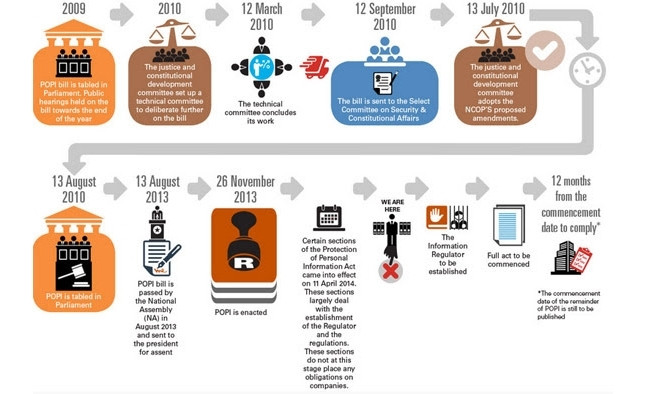For many organisations, the introduction of data privacy and security policies such as those contained in the Protection of Personal Information Act (POPI) require a significant change in process, technology and employee behaviour.
Alison Treadaway, Managing Director of customer communication management specialist, Striata, says she firmly believes organisations with a strong company culture are more likely to achieve the required behavioural changes when a business shifts. "I'm not referring to organic growth or minor policy changes, but rather to major-step changes in your business ? those moments (or more likely months) of accelerated change that require a high level of employee enthusiasm to succeed."
Treadaway says: "It may be a merger or acquisition, a strategic shift, opening a new region, or addressing new legislation ? all these events will introduce change on multiple levels within your business. The bottom line is ... if your people don't buy in to the new vision, effecting the change will be an excruciating uphill battle and quite possibly result in failure."
Will POPI be a step change for your organisation?
Companies may have completed their gap analysis, updated the relevant company policies and appointed an information officer. They might even have a pile of manuals ready to distribute to staff for training, but according to Treadaway, the real achievement of compliance with this Act does not lie in the policy documentation or compulsory training sessions ... but rather in the buy-in from everyone with access to customer data.
"Companies need to consider who in their organisation is able to view, edit, save, retrieve or destroy personal information of another individual or company in the course of their job," explains Treadaway.
"Every person or department could potentially affect an organisation's data security. It is therefore imperative that companies understand the requirements of the Act and their role in safeguarding data. But documents and training sessions are not going to breed the sense of ownership that is needed from each employee in order to safeguard a company's professional reputation and ability to continue doing business," stresses Treadaway.

Here is a reminder where we are in the POPI process - a great infographic by KPMG that explains it all:
Why is culture important?
Company culture informs how people behave at work. How they approach their jobs on a day-to-day basis is also how they will respond to change.
"If a company culture breeds clock-watchers, conformers, nay-sayers or territory defenders, then these qualities are likely to be amplified during periods of intense change," explains Treadaway.
However, Treadaway says if a company's culture promotes continuous learning, accountability, personal growth and encourages people to challenge the status quo, then it has already set a foundation for the collective behaviour that strives for and celebrates progress.
Treadaway says: "At Striata, we've defined the 'Nine Big Rules that make us Awesome'. Every employee has a copy and all new hires go through the 'Awesome' induction session. We believe being deliberate in communicating and nurturing certain behaviours helps us to achieve two things:
"1. Employees understand their roles and the impact they can have on the Big Picture.
"Culture isn't driven by the big decisions made in the plush boardroom, but in the everyday decisions made by all levels of employees. In providing context upfront for why Striata employees are likely to behave in a certain way, we help new people understand how to engage with their colleagues and get things done.
"2. An existing framework for introducing change without discomfort.
"Embedding certain values into the collective behaviour of your staff provides a solid foundation for the times when you need to shake things up, stretch your capacity or steer the ship in a new direction.
"Every organisation needs to define their own company values, but there are certain fundamental cultural elements that will enable an organisation to keep evolving and to meet challenges ? even step changes like POPI that have far-reaching effects," concludes Treadaway.
Alison Treadaway
Managing Director of Striata, South Africa and Director, Striata Communication Solutions.
Alison Treadaway is a director at global paperless communication specialist, Striata. In addition to running the African region, she is involved in defining strategy, improving business efficiency, nurturing organisational culture, promoting employee wellness and mentoring talent.
Treadaway has 18 years of experience in the ICT sector, having worked at Internet Solutions and Dimension Data prior to joining Striata in 2002. She holds a Bachelor of Arts (Languages, WITS) and a post-graduate diploma in business administration from Wits Business School.
As the custodian of Striata's organisational culture, she is particularly interested in protecting and enhancing Striata's stories, traditions and unique approach to achieving success. To this end, she interviews 90% of approved candidates to ensure that Striata's work ethic and social culture will continue to thrive as the organisation grows.
Share
Striata
Striata unlocks the power of e-mail and mobile messaging
The company's electronic delivery solutions dramatically increase customer adoption of paperless bills, statements, policies, marketing and other high volume system-generated documents.
The world's largest financial services, utility, insurance, retail and telecommunications companies achieve unrivalled results by replacing print and mail with Striata's interactive electronic documents and transactional messages.
Striata's enterprise platform, strategy and support services:
* drive significant paper suppression
* deliver ongoing cost savings
* accelerate payments
* enhance the customer experience
* enable regulatory compliance
Its comprehensive solutions expand the digital dialogue through personalised customer life cycle messaging, retail receipts, notifications and alerts.
A global paperless communications specialist with over a decade of experience, Striata has operations in New York, London, Johannesburg, Hong Kong, Sydney and partners in North and Latin America, Europe and Asia Pacific.
Editorial contacts